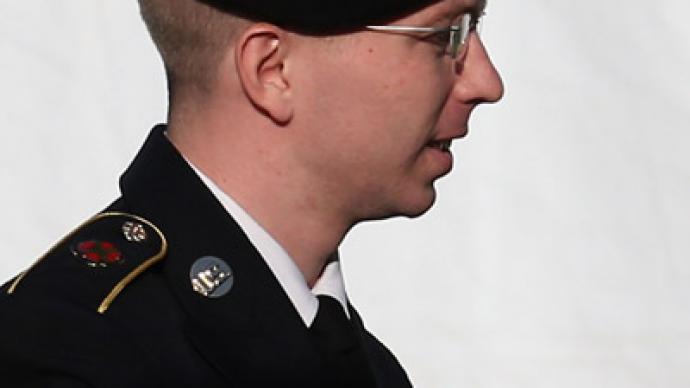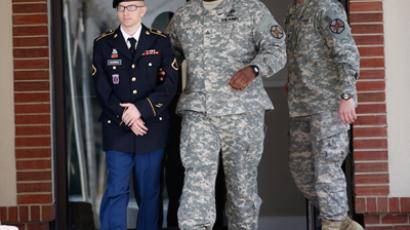Bradley Manning will be credited 112 days for horrendous stay at Quantico

The military judge presiding over the government’s prosecution of Private first class Bradley Manning agreed to take 112 days off the accused WikiLeaks source’s eventual sentence on grounds that he was subjected to unlawful pretrial punishment.
From a courthouse on the grounds of the Ft. Meade military base outside of Baltimore, Maryland Tuesday afternoon, Col. Denise Lind said she would not relinquish charges against Pfc Manning, a 25-year-old soldier alleged to have given roughly 250,000 US State Department diplomatic cables and a trove of other sensitive information to the WikiLeaks whistleblower site. She did, however, agree to erase nearly four months off any sentence Manning is handed in response to the time he spent detained at a military brig in Quantico, Virginia.
If Manning is convicted of aiding the enemy, the most severe of the nearly two-dozen charges he’s up against, he could be sentenced to life in prison. He has expressed interest, however, in pleading guilty to some of the lesser counts in hopes of receiving leniency in terms of sentencing. The actual military trial against Manning — the formal court-martial — is not slated to begin until March 2013.
Col. Lind was presented with the opportunity to drop charges against the soldier after hearing weeks of testimony in December that focused on the time Pfc Manning spent detained at Quantico. For roughly nine months, Manning was kept in a small, isolated cell, subjected to conditions considered tantamount to torture by a special rapporteur for the United Nations.
“The most entertaining thing in my cell was the mirror. You can interact with yourself. I spent a lot of time with it,” Pfc Manning said last month when he took the witness stand for the first time.
His jailers, many of whom also testified at Ft. Meade during the recent unlawful pretrial punishment hearings, largely considered Manning distant, withdrawn and isolated. Citing “erratic” behavior, some Quantico officials said Manning’s actions prompted them to keep him subjected to harsh conditions, at times stripping him of his clothes and keeping him out of contact from all other detainees.
“Would you agree with me that if you’re talking with your jailers and you make causal conversation and then they use that casual conversation to take away your underwear from you, then you might stop talking to your jailer?” Manning’s civil attorney, David Coombs, quizzed Quantico staffers during last month’s hearing.
According to tweets sent from Ft. Meade on Tuesday by blogger Kevin Gosztola, Manning was "not held in solitary confinement” at Quantico. “It means alone and without human contact,” she said. Manning says he was allowed outside of his cell for less than an hour a day.
Additionally, Gosztola writes that the judge “found no evidence of command influence that led to Bradley Manning being kept in unlawful pretrial conditions at Quantico.” Other witnesses at Ft. Meade confirmed that Manning will be credited due to the treatment he received from November 1, 2010 through January 18, 2011, when he was held in Quantico under prevention-of-injury status. Judge Lindh also took into account seven days where Manning was kept on excessive suicide risk and a 20-day period where he was largely prohibited from wearing clothes.
"Judge Lind said Bradley Manning was not in solitary
confinement because he was visited daily & could see the
hallway outside his cell," Nathan Fuller, a supporter of the
soldier, tweeted on Tuesday.
Julian Assange, the WikiLeaks founder alleged to have received military documents from Pfc Manning, has publically condemned the US justice system in recent weeks during a series of media appearances conducted from the Ecuadorian Embassy in London. Assange, an Australian native who formerly resided in Sweden, has been granted diplomatic asylum from Ecuador to avoid questioning in Sweden unrelated to WikiLeaks. Should he be extradited to Sweden, though, Assange fears he will be sent to the United States and subjected to the same treatment bestowed on his accused source.
“The material that Bradley Manning is alleged to have leaked has highlighted astonishing examples of US subversion of the democratic process around the world, systematic evasion of accountability for atrocities and killings, and many other abuses,” Assange wrote last month in a statement published by WikiLeaks. Speaking to CNN, however, he said that the diplomatic cables credited to Manning aren’t of utmost importance in the grand scheme of things.
“The case is not about whether Bradley Manning allegedly stole cables or not. The case is about the abuse of Bradley Manning,” Assange said.
In regards to what the soldier is accused of leaking, though, Assange maintains that Manning may have had an influential role in ending America’s eight-year-long war in Iraq. One of the documents the government says Manning released, video footage showing the crew of a US helicopter firing at Iraqi civilians, was published by WikiLeaks under the name “Collateral Murder” to much media attention.
“It was WikiLeaks’ revelations — not the actions of President Obama — that forced the US administration out of the Iraq War,” Assange wrote last month. “By exposing the killing of Iraqi children, WikiLeaks directly motivated the Iraqi government to strip the US military of legal immunity, which in turn forced the US withdrawal.”
Also on Tuesday, Coombs said that the defense would like to call Adrian Lamo to testify during the upcoming court-martial. Lamo, a 31-year-old security expert who has faced federal prosecution himself, was approached online by Manning in 2010.
“I was the source of the 12 July 07 video from the Apache Weapons Team which killed the two journalists and injured two kids,” Manning tells Lamo in chat transcripts.
Coombs says he hopes to prove that the information his client is accused of leaking "could not be used to harm the US or advantage any foreign nation,” the Guardian reports. The defense has also expressed interest in having retired Air Force Col. Morris Davis testify during the upcoming court-martial. A former chief prosecutor for the government at Guantanamo Bay, Coombs could ask Col. Davis to discuss the severity of the damage — or lack thereof — caused by Wikileaks’ publishing of Gitmo files, also attributed to Manning.
In an update from Ft. Meade published Tuesday afternoon, blogger Kevin Gosztola reports that the government must show Pfc Manning had “general evil intent” with respect to the “aiding the enemy” charge. In other words, Cpt. Angel Overgaard argued for the prosecution, the US must prove Manning “knew he was dealing with an enemy of the US” when he allegedly handed files to Assange.
According to Ed Pilkington, a journalist with the paper who has covered the case extensively from Ft. Meade, Coombs believes the content of the chat logs with Lamo, coupled with other evidence to be called on at trial, would show his client had no “evil intent” with regards to the WikiLeaks files.
"Every case that charges Article 104 [aiding the enemy] deals with somebody who had given information directly to the enemy. This case is unprecedented," POLITICO quotes Coombs arguing early Tuesday. "There's been no case in the entire history of military jurisprudence that dealt with somebody providing information to a legitimate journalistic organization and having them publish it and that involved dealing with the enemy."
The government is expected to argue that, through WikiLeaks’ publishing of the diplomatic cables, Manning supported al-Qaeda in the Arab Peninsula. Although a conviction of aiding the enemy typically carries a death sentence, the government says they will not seek capital punishment.
“So as charges currently stand, #BradleyManning faces life in military custody with no chance of parole, minus 112 days,” the Guardian’s Pilkington tweeted from Ft. Meade on Tuesday.
Judge Lind’s decision took over an hour-and-a-half to recite in the courtroom.














